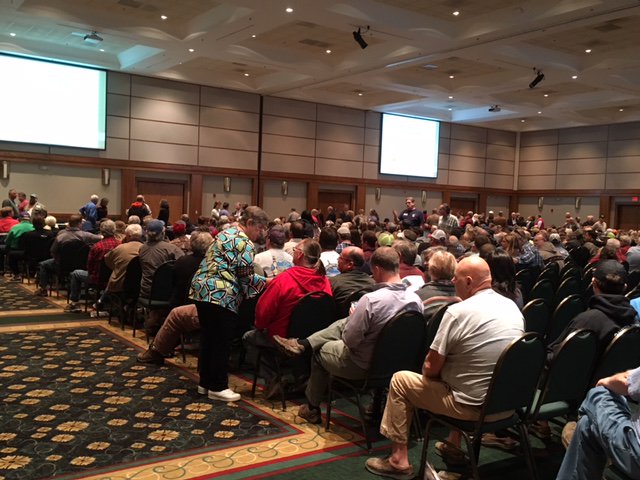More than 1,000 members of North Carolina’s fishing communities and several dozen trawlers showed up Jan. 17 to oppose a petition recommending sweeping regulations on the state’s shrimpers.
More than 1,000 people from North Carolina's commercial fishing community attended the meeting to discuss proposed regulations on the state's shrimp industry. Maureen Donald photo.The crowd listened during an 8-hour meeting to the regulations proposed under a “petition for rulemaking” by the North Carolina Wildlife Federation, submitted by the Southern Environmental Law Center on the federation’s behalf, to reduce bycatch in shrimp trawls. The proposed regulations, circumventing the rulemaking policy in place, included shortening the number of days shrimp trawlers could fish, how much they could fish and where they could trawl in state waters.
Blakely Hildebrand of the Southern Environmental Law Center said during her presentation that the main goal of the proposal is to reduce bycatch, especially juvenile spot, croaker and gray trout, that spawn in coastal and inshore waters and get caught and die in shrimp nets.
“It is estimated that for every pound of shrimp harvested in North Carolina waters, over four pounds of non-target catch, including juvenile finfish, are discarded,” the petition says.
The fact that North Carolina is the only state on the East Coast that still allows shrimp trawling in sounds and rivers was repeated several times by Hildebrand and other proponents of the petition. The commercial fishing community, however, has a very different take on the issue.
“The fact is this state’s Marine Fisheries Division is doing an outstanding job managing the fishery,” said Norman Shepard. “That’s why we are still shrimping and doing very well at it.”
Brent Fulcher, who owns several shrimp boats as well as a seafood market, questioned the logic of looking to hurt fishermen where there isn’t a problem.
“The commercial industry always comes to the table and is always willing to compromise even if we’re not responsible for the perceived problem,” Fulcher says. “If [the N.C. Wildlife Federation) should be looking at anything, it should be the pollution that drains into our sounds from inland locations.”
The state’s restaurant industry is pushing its view by circulating a petition opposing the measures, stating, “More than 90 percent of all shrimp consumed in the country is imported. Importing this highly prized commodity not only puts Americans out of jobs, it jeopardizes our health by marketing a poorly inspected product.”
So many people spoke against the petition, the chairman of the panel had to stop the public hearing while there remained a long list of people signed up to speak. In the end, the five advisory committees present voted to deny the petition.
The petition and the committees’ recommendations will now go to the full Marine Fisheries Commission in mid-February for a final determination on whether the petition goes forward.







